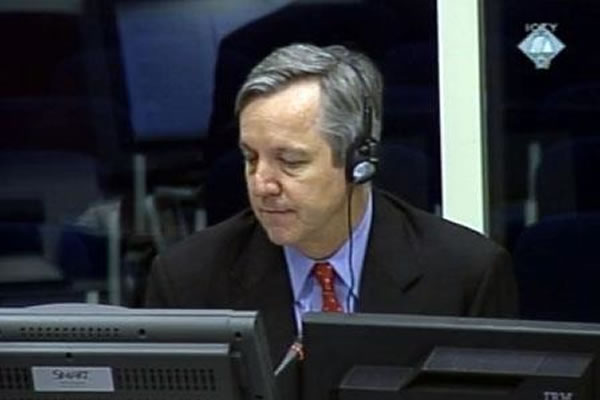Home
RATKO MLADIC – CHARMER AND BULLY
Remembering the behavior of the accused general during the war in BH, high-ranking UN official Anthony Banbury said that Mladic was an ‘intelligent, strategic thinker’, who used a combination of ‘charm and bullying’ in the negotiations and used his ‘undisputed’ influence on the army to create an atmosphere in which civilians in Sarajevo were killed ‘routinely’
 Anthony Banbury, witness at the Ratko Mladic trial
Anthony Banbury, witness at the Ratko Mladic trial During the last two years of the war in BH, Anthony Banbury was a high-ranking UN official there. In this capacity, he attended a number of meetings with the representatives of the Bosnian Serb political and military leadership, including president Radovan Karadzic and military commander Ratko Mladic. Banbury testified at Karadzic’s trial as a prosecution witness in September 2012. Today Banbury returned to The Hague to give evidence against Mladic. Banbury’s statement to the OTP investigators was admitted into evidence together with a series of reports, cables and letters. Banbury drafted the documents from April 1994 to May 1995 as a political advisor on behalf of the UN civil affairs chief Viktor Andreev. Later, until the end of the war, Banbury worked for the special envoy of the UN Secretary General, Yasushi Akashi.
Prosecutor Bibles read out the summary of the witness’s statement. The witness said that the Bosnian Serb army could ‘change conditions of life in Sarajevo’ by controlling the gas, electricity, water and humanitarian supplies but also by changing the intensity of the artillery and sniper fire against civilians. As the witness said, General Ratko Mladic was the ‘undisputed leader of the army and important decision with military ramifications could only be made with his consent’.
Banbury, who currently holds high office in the UN headquarters in New York, recalled his wartime contacts with Mladic. Banbury described Mladic as a ‘skilled negotiator’ and ‘an intelligent strategic thinker’ who used a combination of ‘charm and bullying’ in his contacts with international representatives. ‘If you fell for his charm, the experience would be pleasant, but if you tried to resist him, then it was not very pleasant’, the witness described.
Mladic obviously liked Banbury’s description because he smiled with pleasure in the dock. The judge warned Mladic to refrain from responding to the witness’s testimony.
Banbury was asked to assess the degree to which Mladic’s activities influenced the war in BH. Based on the 15 months Banbury spent in Sarajevo, he realized that the Bosnian Serb army created a situation in Sarajevo in which the civilians in the city were ‘killed routinely’. Banbury said that people died in random artillery attacks and were killed by snipers which directly targeted civilians. Apart from the physical losses, these activities had a ‘devastating psychological’ effect on the citizens, regardless of their ethnic background. ‘Whoeverventured out into the street was a target, people didn’t know if their children would come back home after they went out the door’, Banbury recounted.
According to the witness, Mladic’s army did not terrorize only the citizens of Sarajevo: the enclaves of Srebrenica, Zepa, Gorazde and other parts of BH were subjected to physical and mental terror. Civilians were killed and expelled, families torn apart and heinous crimes against women were perpetrated, the witness said.
When Judge Flugge asked if the witness warned Mladic at the meetings that such things were happening, Banbury said that he personally didn’t, but his superiors did. In his reports, Banbury recorded the answers he got from Karadzic, Mladic and other representatives of the authorities. Their replies were a combination of ‘attempts to justify their actions, denial and promises’ that the incidents would be investigated, that were never kept.
The cross-examination of the witness began in the second session of the hearing.Linked Reports
- Case : Mladic
- 2013-02-06 CONTESTING SARAJEVO INVESTIGATIONS
- 2013-02-05 WITNESS SPEAKS ABOUT MARKALE ON THE ANNIVERSARY OF MASSACRE
- 2013-02-01 MEDIA WERE ‘UNCONSCIOUSLY’ BIASED
- 2013-02-08 ‘HONEST MAN’ WHO DIDN’T SPEAK THE TRUTH
- 2013-02-11 ‘ROSES’ AND ‘PAWS’ ON ASPHALT IN SARAJEVO
- 2013-02-12 POLICE ‘PLANTED’ EVIDENCE
